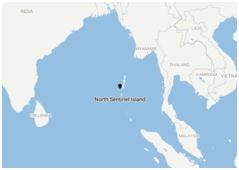

In a policy document, which comes almost two years after American national was allegedly killed by the Sentinelese on the Island, the Anthropological Survey of India (AnSI) says the “right of the people to the island is non-negotiable”.
Context
In a policy document, which comes almost two years after American national was allegedly killed by the Sentinelese on the Island, the Anthropological Survey of India (AnSI) says the “right of the people to the island is non-negotiable”.
About
Who are Sentinelese?
- The Sentinelese people are from an endangered Indian tribe living in North Sentinel Island, located near the Andaman Islands in the Bay of Bengal, India.
- With a population of about 50 to 100, they are among the most isolated of nearly 70 PVTGs across the country.
- They are a primitive hunter-gatherer tribe that entirely relies on the sea and the island forests for food and other resources.
- Also, they are among the five in the Andaman and Nicobar Islands which include Great Andamanese, Onge, Jarawa, and Shompens.
- They are particularly vulnerable tribal group (PVTG).
|
Particularly vulnerable tribal group (PVTG)
|
What are the key observations made by AnSI?
The following observations were made after the first detailed policy draft for the Sentinelese island, prepared at the request of the Andaman and Nicobar Administration.
- Any exploitation of the North Sentinel Island of the Andamans for commercial and strategic gain would spell the death knell for its occupants, the Sentinelese.
- Right of the people to the island is non-negotiable. These rights are unassailable, non-negotiable and uninfringeable.
- The prime duty of the state is to protect these rights as eternal and sacrosanct.
- Therefore, their island should not be eyed for any commercial or strategic gain, for if it were to happen, it surely would be a death knell for its occupants.
Is India doing enough to protect the tribals?
- Indeed, the Indian Constitution is supposed to protect tribal interests, especially tribal autonomy and their rights over land, through the Fifth and Sixth Schedules.
- In India, most of the tribes are collectively identified under Article 342 (1&2) as “Scheduled Tribes”.
- Their right to self-determination is guaranteed by Part X: The Scheduled and Tribal Areas – Article 244: Administration of Scheduled Areas and Tribal Areas.
- Tribals in India are also protected under the PESA Act that was in acted on December 24, 1996 to enable tribal self rule in these areas.
- Then, there are the Panchsheel Principles of Pandit Jawaharlal Nehru, meant to guide government actions in dealing with tribal people.
- Though, India has very enlightened laws dealing with tribals and indigenous people after independence. The actual treatment meted out to tribal people has been mixed.
What needs to be done?
- More knowledge about the tribe: Along with maintaining the territorial integrity of the North Sentinel Island, the document calls for building a knowledge bank on the Sentinelese.
- Study of culture, but from distance: Since ‘on-the-spot study’ is not possible for the tribal community, anthropologists suggest the ‘study of a culture from distance’.
Value Addition
Anthropological Survey of India
- Anthropological Survey of India is the only research organisation to pursue anthropological research in a Governmental setup.
- The Anthropological Survey of India’s genesis was from the Zoological and Anthropological section of the Indian Museum, which became the Zoological Survey of India in 1916.
- In 1945, Anthropology section of the Zoological Survey was carved out to become the Anthropological Survey of India (An.S.I) with Dr B.S.Guha as the founding Director, in 1946.
- Headquarters:Kolkata, West Bengal
- Parent organisation: Ministry of Culture, Government of India




